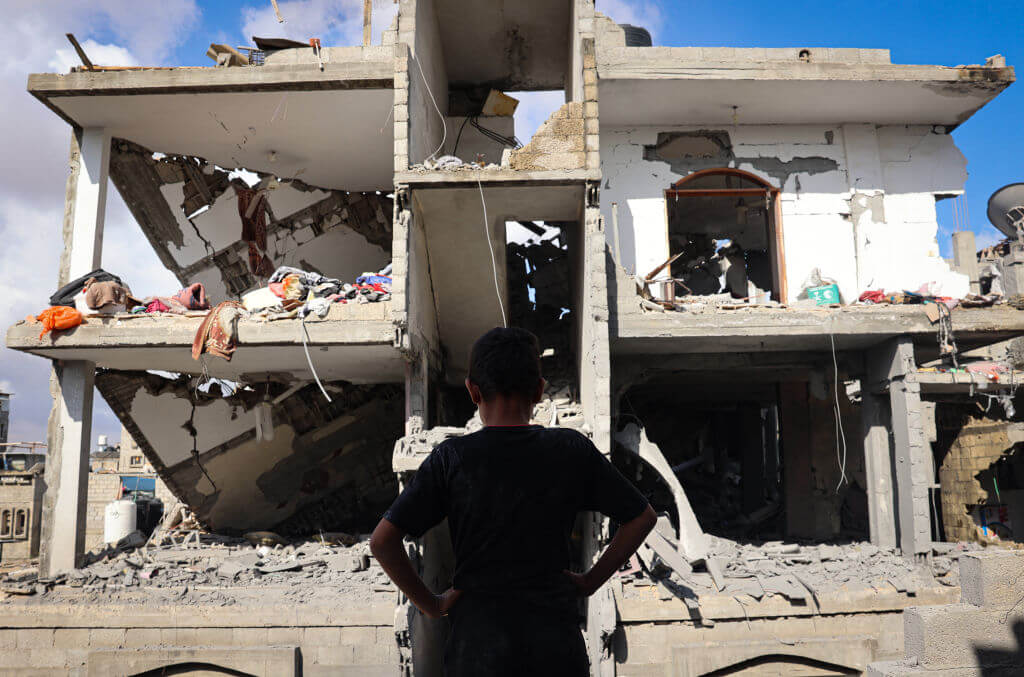U.S. pause on weapons to Israel is just a signal. So is Israel’s Rafah incursion
Beyond quotidian events and troop movements on the ground, when it comes to the U.S. and Israel, there are four levels of engagement

President Joe Biden and Prime Minister Benjamin Netanyahu. Photo by Getty Images
The Prussian general and military theorist Carl von Clausewitz famously said that war is diplomacy by other means. That’s what the limited incursion into Rafah that started Monday is: An effort to pressure Hamas to be more reasonable in the negotiations to free hostages, but not yet the real invasion everybody has been fearing for months.
A corollary might be that the provision of military supplies is politics by other means. That’s what the Biden Administration’s decision to pause the supply of smart bomb munitions to Israel is: An effort to get Prime Minister Benjamin Netanyahu to understand it is in his interest to start paying attention to Washington’s needs and preferences, but not yet the real break in relations many have feared for months.
I do not believe that Biden opposes Israel attacking Rafah, the last redoubt of Hamas inside Gaza. But he wants this to happen only after a massive effort has been undertaken to ensure that the more than 1 million civilians who have been huddling in its environs because of their displacement from other war-torn parts of Gaza have been removed from the line of fire. This logistical project will take weeks, and the fact that it has not yet begun is either evidence that the actual invasion is still far away, or that the Netanyahu government is determined to see a war crimes tribunal at the Hague. I’m guessing it’s the former. Biden’s arms signal is meant to ensure it.
Netanyahu is a political survivor and a master machinator, and he is hoping that the past day’s success in retaking the part of Rafah abutting the Egyptian border will compel Hamas to finally offer an interim ceasefire deal. A partial hostage release in exchange for a temporary halt in the fighting — and release of Palestinian prisoners — that Netanyahu can sell to the far-right extremists on which the survival of his coalition depends.
It is a gamble: the far right may not agree to anything, because in public statements its leaders have made rather clear that they are prepared to write off the hostages in favor of an intense assault to the finish against Hamas. Public opinion in Israel, meanwhile, is moving in the other direction: There is a growing desire to see the hostages returned at any cost, which is probably driving Hamas to inflexibility in the talks.
With war always comes the fog of war, so all public statements and even announced actions need to be taken with more than a grain of salt. To understand what’s going on, we need to maintain a focus on the essence. And the essence is that beyond quotidian events and troop movements on the ground, when it comes to the U.S. and Israel, there are four levels of engagement.
Short-term goals
Most Israelis and most Americans seem aligned here. Both would dearly love to see not only the 132 remaining hostages (many of whom are presumed dead) returned, but also Hamas removed from power in Gaza. It can hardly be otherwise after Hamas started this war with its Oct. 7 massacre, then promised to repeat such action again and again.
Most of the “moderate” axis of Arab nations quietly support this goal as well. But this agreement, important though it seems, has been obscured by the next two levels of engagement.
Tactics on the ground

This is where we see the beginning of the schism that led to Biden’s suspension of a shipment of 3,500 bombs last week.
The United States would like to see far more of a convincing effort by Israel to spare civilians in the crossfire. Although everyone understands Hamas is using the civilians as a human fortification and indeed may be happy to see many of them “martyred,” Israel has not succeeded in rebuffing the suspicion of a light trigger finger. Its leaders argue that the ratio of civilians to combatants has been acceptable for urban warfare – but the world has largely concluded that what matters is not the ratio but the number, and it’s too high.
The United States also would have liked to see a far greater effort to prevent a humanitarian disaster among the million-plus Gazans who are living in tents and scrambling for basic provisions Israel has indeed responded in recent weeks to direct pressure and dramatically increased the number of aid shipments going in – implicitly admitting it has been holding back.
Higher level strategy
This is where the Washington and Jerusalem really diverge. Biden would like to see the disaster of the past seven months end up being the shock that moves the region toward a better future. He has proposed a grand design that involves the formation of a strategic axis between Saudi Arabia and the moderate Sunni nations, Israel, and the West. In exchange, Israel must agree to the Palestinian Authority being restored to power in Gaza (from which it was routed by Hamas in a bloody 2007 coup) and for talks to begin anew on a two-state solution.
Netanyahu has refused this, infuriating much of the Israeli security and strategic establishment, including the minority of its members that once supported him. This seemingly bewildering position is explained by the fourth level of engagement.
Politically, Biden and Netanyahu could hardly be further apart
Biden’s grand diplomatic design requires of Israel things that Netanyahu has agreed to in the past and are clearly in Israel’s interest. Now, he is rejecting them because they would cause the far-right to bring down his coalition. If his government fell and new elections were held — as polls show three-quarters of Israelis want — Netanyahu would be trounced.
He wants to forestall this until memories of the colossal failure of Oct. 7 have dissipated, and there is a plausible victory narrative in the war – which has so far proved elusive. One does not need to be a cynic to believe Netanyahu is scheming to prolong the crisis; it’s what most Israelis think.
Biden, though, needs the war to end as soon as possible. That’s because the ugliness of it, and the dynamics of public opinion and social media, have turned it into a domestic political issue that creates a wedge in the Democratic coalition.
Polls show he is losing young voters over the war, as well as the far left and Muslim Americans — the shorthand for this is “Michigan.” If he turns on Israel decisively, he could lose many of the Jewish voters he needs – the shorthand for this is ”Pennsylvania.” Both are swing states he cannot afford to lose.
Biden’s fate is therefore in the hands of two players who may no longer be fully rational.
The nihilistic jihadi mindset of Hamas is impervious to pressure; they are happy for masses of people to die.
And Netanyahu’s lust for power at the expense of almost everything else suggests a genuine Louis XIV complex; he really does seem to believe “L’etat c’est moi” (I am the state).
Caught in the middle are millions of Israelis and Palestinians who just want to live in peace. Not necessarily all of them – but in my experience, given the right circumstances and absent bad-faith agitators, a majority on both sides.
Correction: An earlier version of this article misstated the nationality of Carl von Clausewitz. He was Prussian, not Russian.















